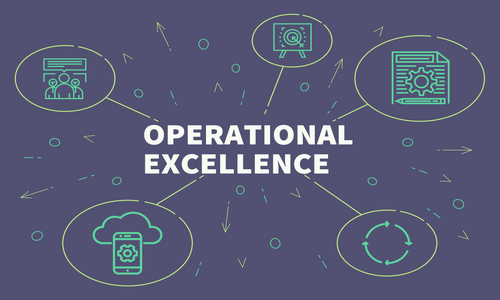Operational Excellence is the ability to carry out the organization’s business strategy more consistently and successfully. It entails making constant modifications to a business to get a competitive edge. Additionally, it aids businesses in creating effective processes where workers concentrate on resolving issues as soon as they happen. The emphasis on Operational Excellence extends beyond the conventional continual improvement to long-term transformations. As a result, using Operational Excellence principles in the business reduces operational risks, lowers costs, and boosts revenues, creating value for customers and shareholders.

Jump ahead to
Operational Excellence
Operational Excellence is a framework that helps companies concentrate on growth and outperform competitors in the execution of their strategies. It is a philosophy that values leadership and problem-solving as the foundations of ongoing development. However, Operational Excellence is not a list of tasks individuals do. It’s more of a mindset that the company and its workers should have.
The Operational Excellence plan aims to surpass customer expectations by enhancing corporate culture and business procedures. Only if the company outperforms its rivals in terms of costs, production output, quality assurance, customer satisfaction, and profitability, it can attain operational Excellence.
Principles of Operational Excellence
The Shingo Institute has developed the 10 principles of Operational Excellence based on Dr Shingo’s decades of study on delivering value and quality to the customer. These principles establish a framework for thinking that may guide the use of any chosen system. Let’s examine the 10 core principles of Operational Excellence in detail.
Respect every individual
The Shingo Model stresses that everyone deserves respect since they are valuable and have potential. This comprises the management, customers, suppliers, and business associates. Having respect for people is important, but companies must also show them that they value them. They can demonstrate respect for their employees by involving them in any necessary improvements. This will increase their sense of empowerment and drive to positively impact the improvements.
Lead with humility
The best improvements happen only when people acknowledge their shortcomings and seek a better solution. A leader must be humble enough to ask for input and feedback, listen intently, reject dogmatic top-down thinking, and continuously learn. This allows employees to respond creatively, propose novel concepts, and take moderate risks.
Seek perfection
Even if it may seem unrealistic, businesses should always aim for perfection. Pursuing it, nevertheless, will foster the conditions for a culture of operational Excellence. Organizations strive for perfection by finding long-term solutions to issues rather than band-aid fixes or by searching for methods to streamline tasks without compromising quality.
Embrace scientific thinking
Innovations are the result of ongoing learning and experimentation. Adopting scientific thinking in business entails being receptive to new concepts, allowing for risk-taking experimentation, and collecting each lesson learned for future use. Therefore, knowing what works and what doesn’t is always valuable. Additionally, experimenting with novel ideas will inspire employees to do the same without the worry of failure.
Focus on the process
Employees tend to place the blame for problems on others. However, the issue frequently stems from the method rather than the individual. With a poor process, even the most effective employees are unable to consistently generate excellent outcomes. Therefore, it is preferable to first determine where during the process the error occurred before simply blaming the employees involved.
Assure quality at the source
Quality outcomes come from correctly performing every task with the best tools and knowledge. Any process that produces poor outputs must identify and handle its root cause. Therefore, it is essential to set up workspaces in a way that will expose potential problems. In addition, if a mistake is made, stop working right away to fix it before moving on.
Flow and pull value
Every business wants to give its customers the most value possible. As a result, businesses should make sure that the workflow and process remain uninterrupted, as any form of disruption results in waste and inefficiencies. Additionally, it’s critical to assess client expectations to make sure the business is only generating what is required to fulfill those requests and nothing more.
Think systemically
There are many various interrelated components that cooperate in a system. Systematic thinking is understanding the connections and interconnections within a system and using that knowledge to decide on process changes. Employees should avoid adopting a limited perspective of their company and remove any obstacles that obstruct the free flow of ideas and information.
Create consistency of purpose
Organizations should make sure that each employee is aware of the organization’s mission, its long-term strategic goals, and his or her contribution to the organization’s success. Everyone is able to make wiser judgments, innovate with intention, and take measured risks because of this clarity of purpose. From day one, employees should be made aware of the organization’s objectives and mission statement. These objectives and guiding concepts should be emphasized every day going forward, not only on the first day.
Create value for the customer
The customer determines what is valued and what they are willing to pay for. A business that ceases providing value cannot endure over time. Therefore, businesses should be aware of what each consumer requires. They must keep striving to comprehend the requirements and demands of their customers.
Conclusion
Operational Excellence is the ultimate goal of all organizations striving for continuous improvement. It assists them in providing the consumer with the good or service at the time they require it, for the least amount of money, with the least amount of work, and at a price, the customer is willing to pay. Enroll in Operational Excellence Training to understand the principles of operational Excellence. Training helps professionals helps to understand Operational Excellence as a whole. This helps them execute their business processes more efficiently. Additionally, it aids in the development of a culture of continuous improvement in an organization.



